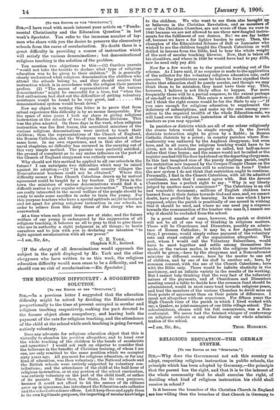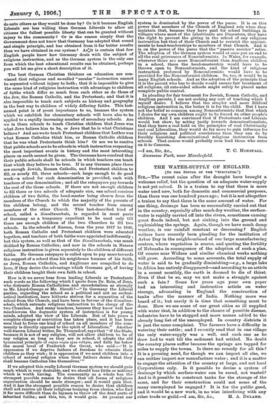RELIGIOUS EDUCATION—THE GERMAN SYSTEM.
[To THE EDITOR OF THE "SPECTATOE."1
Snt,—Why does the Government not ask this country to adopt, respecting religious instruction in public schools, the principle which has been adopted by .Germany,—the principle that the parent has the right, and that it is to the interest of the whole community that he shall exercise the right, of deciding what kind of religious instruction his child shall receive in school ?
Is it because the branches of the Christian Church in England are less willing than the branches of that Church in Germany.. to do unto others as they would be done by? Or is it because English Liberals' are less willing than German Liberals to allow all citizens the fullest possible liberty that can be granted without injury to the community ? Or is the reason simply that the Government does not know that Germany has adopted that sound and simple principle, and has obtained from it far better results than we have obtained in our system ? .As:it is certain that few _English, people know how Germany deals with the subject of religious instruction, and as the German system is the only one from which the best educational results can be obtained, perhaps you will let me give a short description of it.
The best German Christian thinkers on education are con- vinced that religions and so-called "secular" instruction cannot be separated without injury to both; that it is impossible to give the same kind of religious instruction with advantage to children of faiths which differ so much from each other as do those of -the Jew, the Roman Catholic, and the Protestant; and. that it is also impossible to teach such subjects as history and geography in the best 'way to children of widely differing faiths. This last- named point is of great importance to us, because the system which we establish for elementary schools will have also to be 'applied to a rapidly increasing number of secondary schools. Are we in these schools to teach Christian children that Jesus was what Jews believe him to be, or Jews that he is what Christians believe? And are we to teach Protestant children that Luther was what Roman Catholics think him, or Roman Catholic children that he was what Protestants think him? Or are we to resolve 'that public schools are to be schools in which instruction respecting the most important events in history and the most interesting places on earth cannot be given. The Germans have resolved that their public schools shall be schools in which teachers can teach that which they believe to be true. If in any German place there are enough Jewish, Roman Catholic, and Protestant children to fill, or nearly fill, three schools—each large enough to do good work—a school for each denomination is provided, each with teachers of one denomination ; and all the ratepayers pay towards the cost of the three schools. If there are not enough children to fill three or two schools of adequate size, one school receives children of two faiths, the head-master being chosen from the 'members of the Church to which the majority of the parents of the children belong, and the second teacher from among members of the other Church. This last-described kind of school, called a Simultanschule, is regarded in most parts of Germany as a temporary expedient to be used only till there are enough children of the two Churches to fill two schools. In the schools of Nassau, from the year 1817 to 1846, both Roman Catholic and Protestant children were educated together, and teachers of both faiths were appointed indifferently ; but this system, as well as that of the Sintuitauschule, was much disliked by Roman Catholics; and now in the schools in Nassau religions instruction is given separately to the children of different faiths. No German ratepayer is called upon to pay more towards the support of a school than his neighbours because of his faith, as Jews, Roman Catholics, and Anglicans are compelled to do here, if they desire the advantage which Germans get, of having their children taught their own faith in schooL How is it we never hear from leading Liberals or Protestants such words as the following which I quote from Dr. Rein, of Jena, who distrusts Roman Catholicism and sacerdotalism as strongly as Mr. Lloyd-George or Mr. Birrell ?—" In Germany the Liberal parties, regarding the school as a political and not an ecclesi- astical institution, have hitherto striven for a separation of the school from the Church, and have been in favour of the Simultan- saute, which entrusts religious instruction to the clergy of the two Churches. And many teachers, because they know well how mischievous the dogmatic system of instruction is for young minds, adopted the view of the Liberals. But of late years a complete change of conviction has taken place, and it has been seen that to force one kind of school on all members of the com- munity is directly opposed to the spirit of Liberalism." Another well-known Liberal writer, Dr. Thraendorf, says that "if the State, because it is not of any religion, will not allow children to be of any religion so long as they are in school, it adopts the old tyrannical principle of cujus regio ejus religio, and falls far below the moral level of Frederick the Great, who said :=It is oppression if we deprive fathers of freedom to educate their children as they wish ; it is oppression if we send children into a school of natural religion when their fathers desire that they shall become Catholics like themselves.' " If we adopted this really Liberal German system we should gain mnph which is very desirable, and we should lose little or nothing which is worth having. , The community as a whole has the strongest possible reason to desire that all forms of religious organisation should be made stronger; and it would gain that. And it has the strongest possible reason to desire that children Shall not receive all their religions training from clerics, who find it far more difficult than do laymen to throw off the dead parts of inherited faiths ; and this, too, it would gain. At present our,
systen; is dominated by the power of the purse. It is on this power that members of the Church of England rely when they maintain that, because they have paid for school buildings in villages where most of the inhabitants are Dissenters, they have the right to prevent the giving in the school of any religions instruction but that of their Church and to restrict the appoint- ments. to head-teaeherships to members of that Church. And it is on the power of the purse that the "passive resister" relies. The adoption of the German system would at once put an end to all the real grievances of Nonconformists. In Wales, for example, wherever there ara more Nonconformist than Anglican children in a school, there the head-mastership would have to be thrown open to Nonconformists, and the kind of religious instruction preferred by Nonconformists would have to be provided for the Nonconformist children. So, too, it would be in many English schools. And as the adoption of the principle that it is the parent who has to decide would ensure fair treatment of all religions, all rate-aided schools might safely be placed under complete public control.
In pleading for fair treatment for Jewish, Roman Catholic, and Anglican parents, I am not seeking any sort of teaching which I myself desire. I believe that the simpler and more Biblical religious instruction is, the better it is for the child. But I have not the belief so common among Nonconformists that that which I desire for my own children ought to be forced on other people's children. And I am convinced that if Protestants and Liberals would but show, by acting justly towards denominationalists, that they have a real hold on the principles of real Christianity and real Liberalism, they would do far more to gain influence for their religions and political convictions than they can do by forcibly banishing denominational religious instruction from schools. That course would probably soon lead those who enter on it to Canossa.
Swanscoe Park, near Macclesfield.



















































 Previous page
Previous page